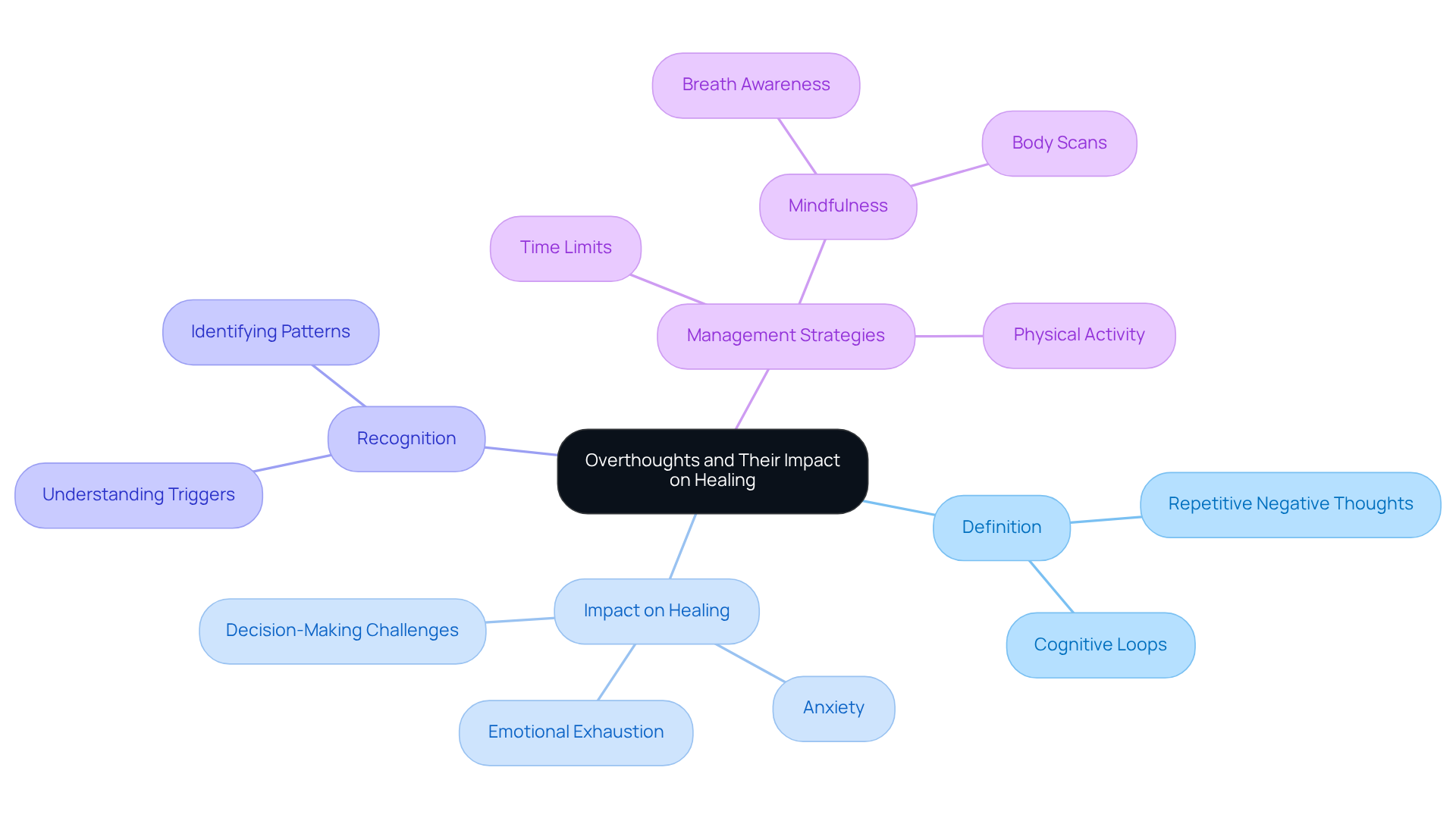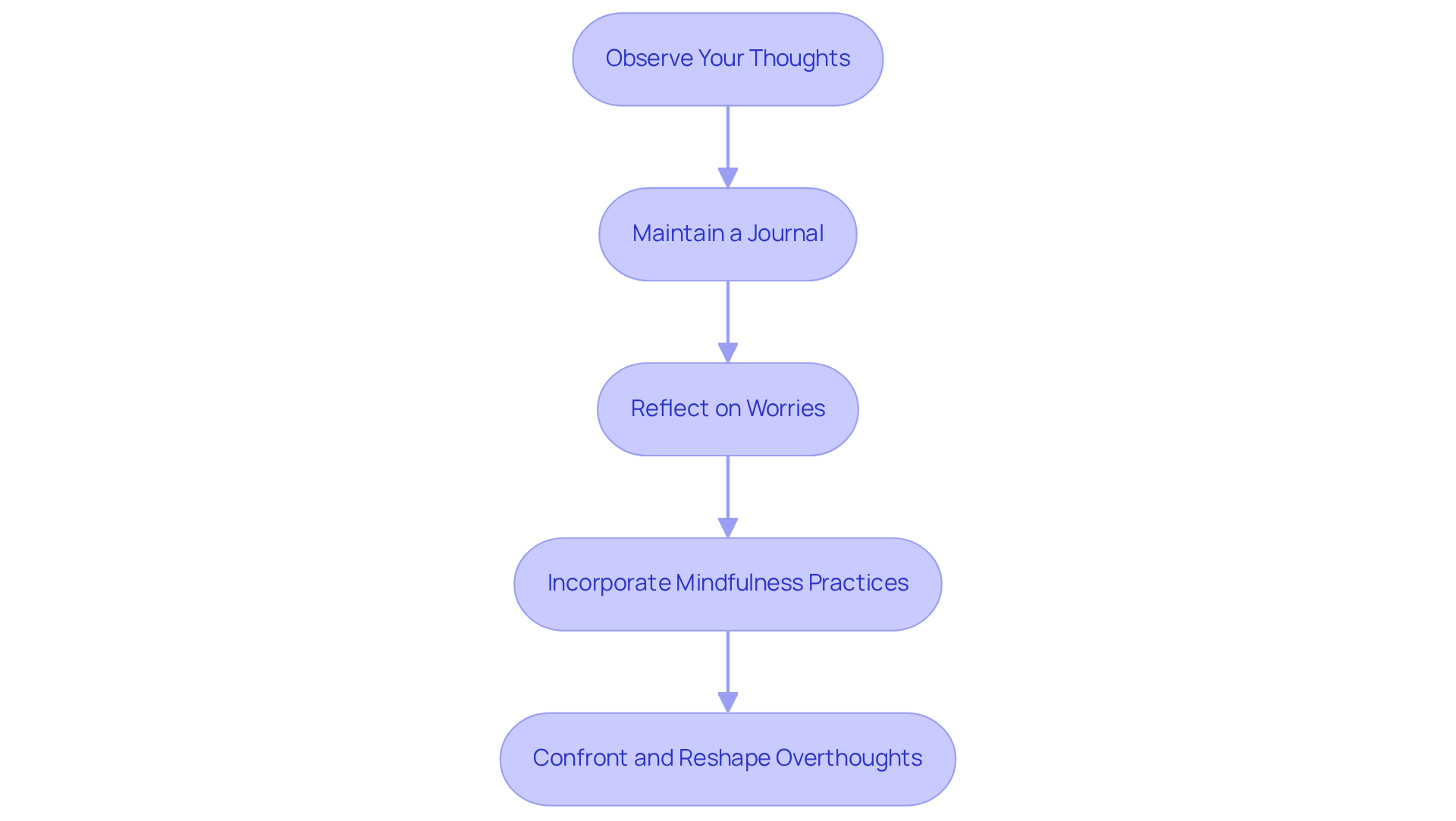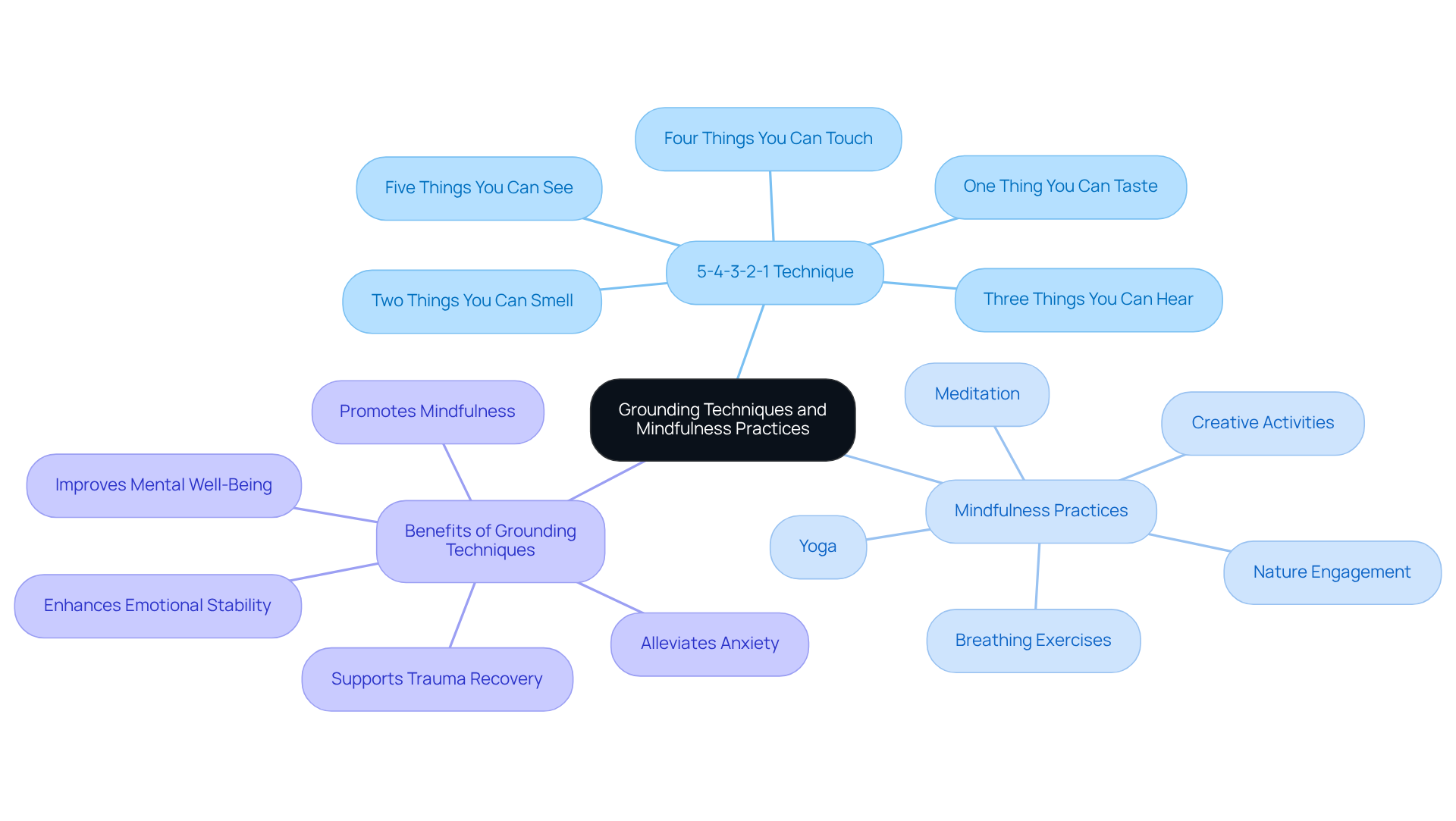Overview
The article "4 Steps to Overcome Overthoughts for Effective Healing" gently guides readers through strategies designed to manage overthoughts that can impede the healing journey, especially for trauma survivors. It highlights the significance of:
- Self-awareness
- Grounding techniques
- Mindfulness practices
- Seeking professional support
Have you ever felt overwhelmed by your past? These methods can empower individuals to break free from negative thought cycles, ultimately enhancing their emotional well-being. As we explore this further, it becomes clear how nurturing these practices can be in fostering a sense of safety and comfort on the path to healing.
Introduction
Overthinking can serve as a significant barrier to emotional healing, often ensnaring individuals in cycles of anxiety and stress. Have you ever felt overwhelmed by your past? The relentless replay of distressing thoughts can impede progress, especially for those on the path to recovery from trauma. This article explores practical steps to help you break free from the grip of overthoughts, fostering self-awareness and integrating mindfulness techniques that nurture emotional stability.
But what if the very thoughts intended to protect us are the ones hindering our journey towards true recovery? As we delve deeper, let's discover how to gently navigate these challenges together.
Define Overthoughts and Their Impact on Healing
Overthoughts frequently appear as repetitive, negative thoughts that can spiral into cycles of anxiety and stress. Have you ever felt overwhelmed by your past? These mental loops frequently involve excessive worrying about past mistakes or future uncertainties, making it challenging to find clarity. For many trauma survivors, excessive rumination is a significant hurdle, exacerbating emotional exhaustion and hindering the healing process. Research shows that this kind of rumination complicates decision-making and intensifies feelings of helplessness, creating formidable barriers to recovery from trauma and anxiety disorders.
Individuals may find themselves replaying distressing events in their minds, which prevents them from processing their emotions effectively. Recognizing these patterns is crucial; it serves as the first step toward breaking free from the grip of overthoughts. By addressing these cognitive habits, individuals can pave the way for healthier coping mechanisms and foster a more positive trajectory in their healing journey.
Strategies such as —an integral part of the therapeutic process at The Emerald Couch—setting time limits for decisions, and engaging in physical activity can be effective in managing overthoughts. Mindfulness techniques, such as breath awareness and body scans, enhance emotional regulation and self-awareness, further supporting trauma recovery.
The holistic approach and individualized support offered by The Emerald Couch empower clients to navigate their mental health challenges effectively, ensuring that treatment plans are tailored to their unique needs and goals. As we explore this further, remember that seeking help is a courageous step toward healing. You are not alone on this journey.

Cultivate Self-Awareness to Identify Overthinking Patterns
To nurture self-awareness, begin by observing your mental processes without judgment. Have you ever felt overwhelmed by your thoughts? Maintaining a journal can be crucial in monitoring instances of overthoughts; take a moment to record the triggers and feelings linked to these reflections. Reflect on questions such as, 'What am I truly worried about?' Are these ideas grounded in reality or merely assumptions? Mindfulness practices, including meditation and deep breathing, can further enhance self-awareness by anchoring you in the present moment.
As we explore this further, identifying your patterns of overthoughts enables you to confront and reshape these notions, reducing their impact on your emotional well-being. Methods like the Awareness Diary encourage you to document your overthoughts, feelings, and bodily sensations associated with excessive thinking, offering clarity and understanding of your mental processes. By incorporating these mindfulness techniques, you can effectively diminish the hold of overthoughts and cultivate a more balanced perspective.
Remember, it’s okay to seek help on this journey. You’re not alone, and taking these steps can lead to and self-discovery.

Implement Grounding Techniques and Mindfulness Practices
Grounding techniques are vital for reconnecting with the present moment and alleviating the burden of overthoughts. One particularly effective method is the '5-4-3-2-1' technique. Have you tried identifying:
- Five things you can see
- Four things you can touch
- Three things you can hear
- Two things you can smell
- One thing you can taste?
This simple exercise gently shifts your focus from racing thoughts to your immediate surroundings, and a sense of calm.
In addition to grounding techniques, incorporating mindfulness practices like meditation or yoga into your daily routine can significantly enhance your clarity of thought and emotional stability. These nurturing practices encourage you to observe your thoughts without judgment, creating space to release the urge to control or overthoughts. For those who have experienced trauma, these techniques not only promote relaxation but also help establish a deeper connection to the present moment, ultimately supporting emotional healing and resilience. Consistent engagement with mindfulness can lead to meaningful improvements in mental well-being, empowering individuals to manage worry and stress more effectively.
As we explore these practices further, consider how they might fit into your life. Remember, seeking support and guidance is a courageous step towards healing and growth.

Seek Professional Support for Tailored Healing Strategies
When excessive contemplation becomes overwhelming, seeking professional support is a vital step in your healing journey. Have you ever felt overwhelmed by your past? At , our therapists are dedicated to addressing trauma and stress, helping you pinpoint the root causes of your overthoughts and creating tailored strategies to manage your overthoughts effectively.
Cognitive Behavioral Therapy (CBT), along with methods like and Reprocessing (EMDR) and Cognitive Processing Therapy (CPT), can be especially beneficial in this context. These approaches emphasize altering negative mental patterns and behaviors linked to various disorders, including PTSD, stress, and depression.
Research shows that CBT is widely used for anxiety, making it a popular choice for individuals dealing with overthoughts. Our therapists, trained in trauma-informed care, foster a safe and supportive environment for you to explore your thoughts and feelings. This space allows for the processing of past experiences and helps mitigate the impact of overthoughts on your mental health.
We offer both face-to-face counseling and telehealth therapy options, ensuring that you receive the support that best fits your needs.
Remember, reaching out for help is a sign of strength and a crucial step toward recovery. You don’t have to navigate this journey alone; we are here to support you every step of the way.
Conclusion
Overcoming overthoughts is a vital part of the healing journey, especially for those facing trauma and anxiety. Have you ever felt overwhelmed by your past? By recognizing the nature of overthoughts and their harmful effects on mental health, you can take proactive steps to reclaim your emotional well-being. This journey begins with acknowledging these patterns and embracing strategies that promote mindfulness, self-awareness, and professional support.
In this article, we highlight four key steps:
- Defining overthoughts and their effects
- Cultivating self-awareness
- Utilizing grounding techniques
- Seeking tailored professional support
Each of these steps is essential in breaking the cycle of negative thinking and nurturing a healthier mindset. Mindfulness practices and grounding exercises not only help reduce anxiety but also empower you to stay present and engaged in your healing journey.
Ultimately, remember that you do not have to travel the path to overcoming overthoughts alone. Seeking professional help is a courageous and vital step toward recovery. It enables you to develop personalized strategies for managing your thoughts and emotions. Embracing these practices and reaching out for support can lead to profound healing and growth, transforming the way you navigate your mental health challenges.
Frequently Asked Questions
What are overthoughts?
Overthoughts are repetitive, negative thoughts that often lead to cycles of anxiety and stress, typically involving excessive worrying about past mistakes or future uncertainties.
How do overthoughts affect healing?
Overthoughts can create mental loops that hinder emotional processing, exacerbate feelings of helplessness, and complicate decision-making, significantly obstructing the healing process for trauma survivors.
Why is recognizing overthought patterns important?
Recognizing these patterns is crucial as it is the first step toward breaking free from the grip of overthoughts, allowing individuals to develop healthier coping mechanisms and promote a more positive healing journey.
What strategies can help manage overthoughts?
Effective strategies for managing overthoughts include practicing mindfulness, setting time limits for decisions, and engaging in physical activity. Mindfulness techniques like breath awareness and body scans can enhance emotional regulation and self-awareness.
How does The Emerald Couch support individuals dealing with overthoughts?
The Emerald Couch offers a holistic approach and individualized support, empowering clients to navigate their mental health challenges with tailored treatment plans that address their unique needs and goals.
What is the significance of seeking help for overthoughts?
Seeking help is a courageous step toward healing, and it is important to remember that individuals are not alone on this journey.




